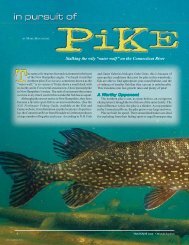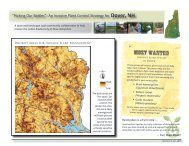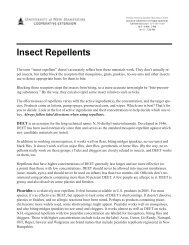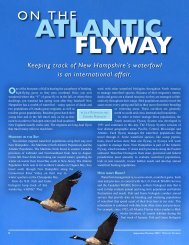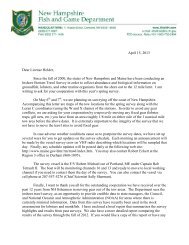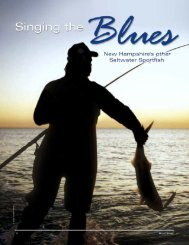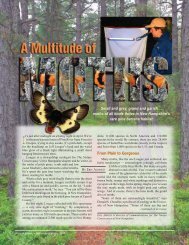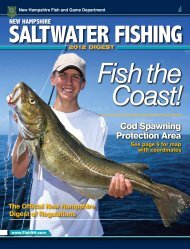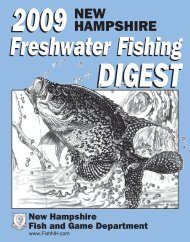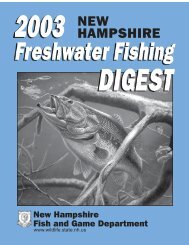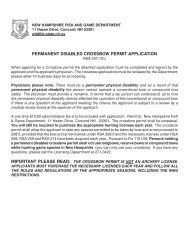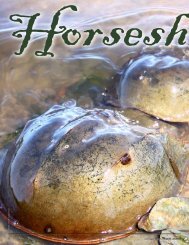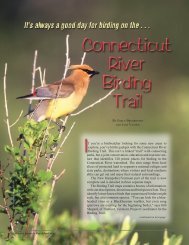the 2010 digest - New Hampshire Fish and Game Department
the 2010 digest - New Hampshire Fish and Game Department
the 2010 digest - New Hampshire Fish and Game Department
You also want an ePaper? Increase the reach of your titles
YUMPU automatically turns print PDFs into web optimized ePapers that Google loves.
<strong>Fish</strong> Consumption Guidelines<br />
Is it safe to eat <strong>the</strong> fish?<br />
<strong>Fish</strong> Consumption Guidelines<br />
<strong>Fish</strong> can be an important part of a healthy diet, but some fish<br />
contain varying levels of pollutants like mercury. Because of this,<br />
<strong>the</strong> NH <strong>Department</strong> of Environmental Services recommends <strong>the</strong><br />
following guidelines for eating freshwater fish that you catch in<br />
<strong>New</strong> <strong>Hampshire</strong>:<br />
• Pregnant <strong>and</strong> nursing women, <strong>and</strong> women who may become<br />
pregnant can safely eat ONE, 8-ounce meal of freshwater fish<br />
per month.<br />
• Children under age 7 can safely eat ONE, 4-ounce meal of<br />
freshwater fish per month.<br />
• All o<strong>the</strong>r adults <strong>and</strong> children age 7 <strong>and</strong> older can safely eat<br />
FOUR, 8-ounce meals of freshwater fish per month.<br />
• When eating bass, pickerel, white perch or yellow perch, limit<br />
consumption to fish 12 inches or less in length while following<br />
<strong>the</strong> above guidelines.<br />
Stocked trout contains relatively low levels of mercury. For rainbow<br />
<strong>and</strong> brown trout, women of childbearing age <strong>and</strong> children<br />
can safely eat ONE meal per week; o<strong>the</strong>rs can eat SIX meals per<br />
week. Brook trout could be ei<strong>the</strong>r stocked or from a native population,<br />
<strong>and</strong> <strong>the</strong>refore should be consumed at <strong>the</strong> rate of <strong>the</strong> general<br />
freshwater advisory above.<br />
<strong>Fish</strong> from several waterbodies in <strong>New</strong> <strong>Hampshire</strong> have been shown<br />
to have higher than average mercury concentrations. For <strong>the</strong> waterbodies<br />
identified below, women of childbearing age <strong>and</strong> young<br />
children should not consume any fish; o<strong>the</strong>rs may consume TWO<br />
meals per month:<br />
• Ashuelot Pond, Washington<br />
• Comerford <strong>and</strong> Moore Reservoirs on <strong>the</strong> Connecticut River<br />
• Crystal Lake, Gilmanton<br />
• Dubes Pond, Hooksett<br />
• Jackman Reservoir, Hillsboro<br />
• Mascoma Lake, Enfield<br />
• May Pond, Washington<br />
• Tower Hill Pond, C<strong>and</strong>ia<br />
In addition, NO fish should be consumed from <strong>the</strong> Androscoggin<br />
River from Berlin south to <strong>the</strong> Maine border due to potential<br />
dioxin contamination.<br />
For more information on freshwater <strong>and</strong> saltwater guidelines,<br />
contact:<br />
N.H. <strong>Department</strong> of Environmental Services<br />
Environmental Health Program<br />
(603) 271-1370<br />
www.des.nh.gov (search “fish consumption”)<br />
36 <strong>2010</strong> <strong>New</strong> <strong>Hampshire</strong> Freshwater <strong>Fish</strong>ing Digest



